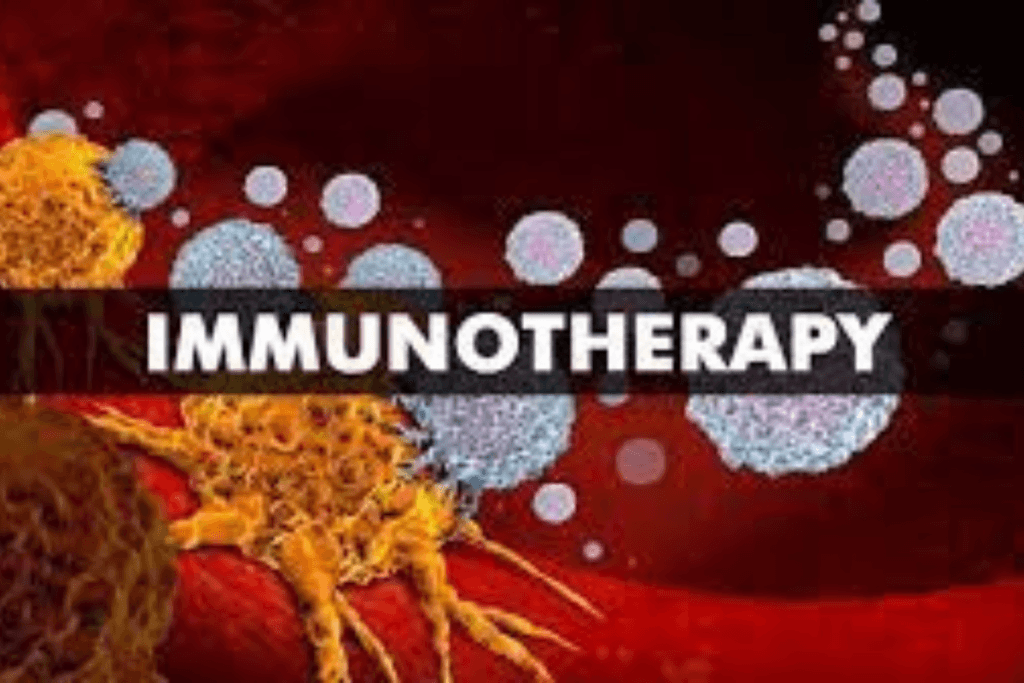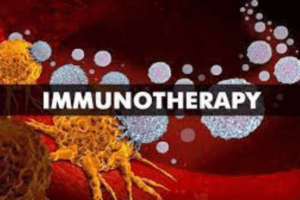
Immunotherapy

What is Immunotherapy?
Immunotherapy is a treatment that helps your immune system fight cancer. Your immune system is like your body’s army, always on the lookout for harmful invaders like viruses and cancer cells. Sometimes, it needs a little help to find and destroy these cancer cells. That’s where immunotherapy comes in.
How Does Immunotherapy Work?
- Your Immune System’s Role: Your immune system’s job is to protect you from harmful invaders, including cancer cells. It has special cells that patrol your body and destroy anything harmful they find.
- Boosting Your Immune System: Immunotherapy trains your immune system to better find and kill cancer cells and helps produce more cancer-fighting cells.
What Types of Cancer Does Immunotherapy Treat?
Immunotherapy can be the first treatment for cancers that have spread. It can also be combined with other treatments like chemotherapy. It’s used to treat various cancers, and different types of immunotherapy target different parts of your immune system.
Types of Immunotherapy:
- Checkpoint Inhibitors:
- How They Work: Think of your immune system as having traffic lights. Sometimes, cancer cells trick the lights into turning red, stopping your immune cells. Checkpoint inhibitors turn these lights green, keeping your immune cells active to fight cancer.
- Cancers Treated: Used for advanced cancers like bladder, cervical, and lung cancer.
- Adoptive Cell Therapy (T-cell Transfer Therapy):
- How It Works: Your immune cells are taken and grown in a lab, then put back into your body stronger and ready to fight cancer. This includes CAR T-cell therapy and Tumor-Infiltrating Lymphocytes (TIL) therapy.
- CAR T-cell Therapy: Your T-cells (a type of immune cell) are modified to better find and kill cancer cells.
- TIL Therapy: TIL cells are grown to be stronger and better at fighting cancer when reintroduced into your body.
- Monoclonal Antibody Therapy:
- How It Works: Lab-made antibodies help your immune system mark and destroy cancer cells. They can also deliver drugs or radiation directly to cancer cells.
- Cancers Treated: Used for various cancers like breast, colorectal, and lymphomas.
- Cancer Vaccines:
- How They Work: These vaccines train your immune system to recognize and fight cancer cells.
- Examples: The HPV vaccine prevents infections that can lead to certain cancers.
- Immunomodulators:
- How They Work: These substances boost your immune response to cancer. Examples include cytokines and drugs like thalidomide.
- Cancers Treated: Used for cancers like multiple myeloma and advanced lymphomas.
What Are the Side Effects?
- Like most cancer treatments, immunotherapy can cause side effects such as fatigue, rash, diarrhea, and nausea. Your immune system might also attack healthy cells, causing inflammation.
How Do You Receive Immunotherapy?
- Usually given through an IV infusion.
- Treatment schedules can vary: daily, weekly, monthly, or in cycles with breaks to allow your body to recover.
What Are the Benefits?
- Can be effective for cancers that don’t respond to traditional treatments.
- Helps control cancer, sometimes slowing its growth or shrinking tumors.
What Are the Risks?
- Immunotherapy might not work for everyone or all types of cancer.
- There can be side effects, which your healthcare provider will help manage.
Questions to Ask Your Healthcare Provider:
- What type of immunotherapy do you recommend for me?
- Will I receive other cancer treatments along with immunotherapy?
- Are there any clinical trials available to me?
- How will I receive the treatment and how often?
- What side effects should I expect and how can they be managed?
- How will we know if the treatment is working?
When to Contact Your Healthcare Provider:
- If you experience severe
What is Immunotherapy?
Immunotherapy is a treatment that helps your immune system fight cancer. Your immune system is like your body’s army, always on the lookout for harmful invaders like viruses and cancer cells. Sometimes, it needs a little help to find and destroy these cancer cells. That’s where immunotherapy comes in.
How Does Immunotherapy Work?
- Your Immune System’s Role: Your immune system’s job is to protect you from harmful invaders, including cancer cells. It has special cells that patrol your body and destroy anything harmful they find.
- Boosting Your Immune System: Immunotherapy trains your immune system to better find and kill cancer cells and helps produce more cancer-fighting cells.
What Types of Cancer Does Immunotherapy Treat?
Immunotherapy can be the first treatment for cancers that have spread. It can also be combined with other treatments like chemotherapy. It’s used to treat various cancers, and different types of immunotherapy target different parts of your immune system.
Types of Immunotherapy:
- Checkpoint Inhibitors:
- How They Work: Think of your immune system as having traffic lights. Sometimes, cancer cells trick the lights into turning red, stopping your immune cells. Checkpoint inhibitors turn these lights green, keeping your immune cells active to fight cancer.
- Cancers Treated: Used for advanced cancers like bladder, cervical, and lung cancer.
- Adoptive Cell Therapy (T-cell Transfer Therapy):
- How It Works: Your immune cells are taken and grown in a lab, then put back into your body stronger and ready to fight cancer. This includes CAR T-cell therapy and Tumor-Infiltrating Lymphocytes (TIL) therapy.
- CAR T-cell Therapy: Your T-cells (a type of immune cell) are modified to better find and kill cancer cells.
- TIL Therapy: TIL cells are grown to be stronger and better at fighting cancer when reintroduced into your body.
- Monoclonal Antibody Therapy:
- How It Works: Lab-made antibodies help your immune system mark and destroy cancer cells. They can also deliver drugs or radiation directly to cancer cells.
- Cancers Treated: Used for various cancers like breast, colorectal, and lymphomas.
- Cancer Vaccines:
- How They Work: These vaccines train your immune system to recognize and fight cancer cells.
- Examples: The HPV vaccine prevents infections that can lead to certain cancers.
- Immunomodulators:
- How They Work: These substances boost your immune response to cancer. Examples include cytokines and drugs like thalidomide.
- Cancers Treated: Used for cancers like multiple myeloma and advanced lymphomas.
What Are the Side Effects?
- Like most cancer treatments, immunotherapy can cause side effects such as fatigue, rash, diarrhea, and nausea. Your immune system might also attack healthy cells, causing inflammation.
How Do You Receive Immunotherapy?
- Usually given through an IV infusion.
- Treatment schedules can vary: daily, weekly, monthly, or in cycles with breaks to allow your body to recover.
What Are the Benefits?
- Can be effective for cancers that don’t respond to traditional treatments.
- Helps control cancer, sometimes slowing its growth or shrinking tumors.
What Are the Risks?
- Immunotherapy might not work for everyone or all types of cancer.
- There can be side effects, which your healthcare provider will help manage.
Questions to Ask Your Healthcare Provider:
- What type of immunotherapy do you recommend for me?
- Will I receive other cancer treatments along with immunotherapy?
- Are there any clinical trials available to me?
- How will I receive the treatment and how often?
- What side effects should I expect and how can they be managed?
- How will we know if the treatment is working?
When to Contact Your Healthcare Provider:
- If you experience severe side effects.
- If you have any new or worsening symptoms.
Feel free to ask any questions or express concerns you have about your treatment. We’re here to help you through this journey.
side effects. - If you have any new or worsening symptoms.
Feel free to ask any questions or express concerns you have about your treatment. We’re here to help you through this journey.
Recent Post



